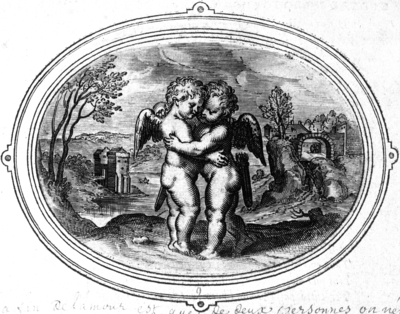Otto Vaenius, Amorum emblemata (1608)
Table of contents ↑Amoris finis est, ut duo unum fiant voluntate et amore [9]

Translations
 |
Socrates
Het doel van de liefde is dat twee één worden in wil en liefde. [Socrates, Symposium?] |
 |
Socrates
The goal of love is that two become one in wish and love. [Socrates, Symposium?] |
Sources and parallels
-
Parallel for the motto: Finis amoris ut duo unum fiant [59]
 (in: Otto Vaenius, Amoris divini emblemata (1615)
(in: Otto Vaenius, Amoris divini emblemata (1615) )
[Compare
)
[Compare ]
]
-
Love reflected in a mirror: Zy blinckt, en doet al blincken [11]
 (in: Pieter Cornelisz. Hooft, Emblemata amatoria (1611)
(in: Pieter Cornelisz. Hooft, Emblemata amatoria (1611) )
[Compare
)
[Compare ]
]
References, across this site, to this page:
- Zy blinckt, en doet al blincken [11]
 (in: Pieter Cornelisz. Hooft, Emblemata amatoria (1611)
(in: Pieter Cornelisz. Hooft, Emblemata amatoria (1611) )
)
- Finis amoris ut duo unum fiant [59]
 (in: Otto Vaenius, Amoris divini emblemata (1615)
(in: Otto Vaenius, Amoris divini emblemata (1615) )
)

